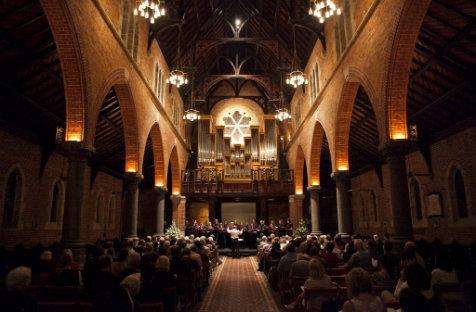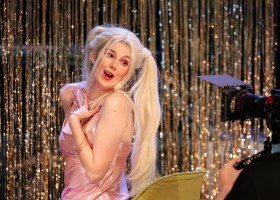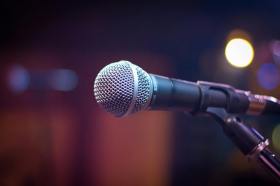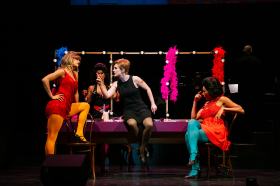Messiah is one of the greatest hits of all time, from its first performance in 1742 to continuing annual presentations today, usually seen at Christmas and Easter. Handel wrote several variations of Messiah, for various performances, and small changes are often made by conductors or to accommodate performer availability. The English language oratorio sees a compilation of Biblical texts that follow prophecies, the life, suffering and future promise of the Christian Messiah, presented in various musical styles, from solo recitatives to choral celebrations. The most famous section, the ‘Hallelujah Chorus’, is instantly recognised by most people, even those with absolutely no interest in sacred music.
While many performances from the Victorian era onwards have featured large orchestras and massed choirs, the score used by Joseph Nolan for this Perth performance was researched and compiled by University of Western Australia Emeritus Professor Sandra Bowdler in 2011 for a co-production between St George’s Cathedral and Festival Baroque Australia.
The English words are enhanced by the music, and each soloist employed beautifully clear diction to profoundly move the audience. Beyond being pitch perfect, Andrew Foote (bass) was pleasantly light on the ear and impressed with ‘the last trumpet’, interacting well with Leanne Sullivan’s trumpet solo. Paul McMahon’s tenor was strong and Sara Macliver (soprano) was clear and precise, with exquisite control. Beyond Handel’s bias towards the original mezzo singer and resulting lovely writing for the voice, Fiona Campbell had the most wonderfully rich, fluid delivery to carry her sections throughout the hall.
St George’s Cathedral Consort was an absolute joy. It was truly astounding to witness such a talented selection of singers, able to take each aspect of Handel’s diverse score and proving the human voice to be a versatile and powerful instrument when so thoroughly disciplined and controlled. From the precise delivery of lines in unison, so clear and timed to sound as if one voice were rapidly enouncing the words, to the richly layered tumbling of themes and motifs that filled the hall in densely chaotic harmony, there were no passengers in this choir at all. What initially seemed ‘missing’ in terms of numbers was more than rectified by the amount of passion expressed, and in the ‘Hallelujah Chorus’ the energy rolling off the choir, through the rest of the stage and over the hall did not disappoint in the slightest.
If there were no passengers in the chorus, the orchestra looked decidedly understrength to the eye of one used to the modern symphony. Baroque trumpets appeared challenging to play but the tone was exquisite and the strings brought more tonal texture than I would have thought possible without woodwind support. Stewart Smith was working double time on the harpsichord and the chamber organ, and Paul Wright, overall Leader of the Orchestra, commanded an accomplished group of musicians in The Musicians’ Table.
Conductor Joseph Nolan impressed with his energy, which increased through each part of the performance, with only a slightly broader smile reflecting his mood as he brought in the audience to stand for the Hallelujah Chorus. The low key presentation and smooth transitions between sections minimised any time-wasting and threw the musical vision and skill into sharp focus. My only criticism of the night would be the lack of a high fidelity recording of the event, as it deserved a much wider audience.
A, iconic piece, wonderfully researched and passionately presented, and given fresh immediacy by the dedication and skill of the performers who made the most of the fantastic acoustic potential of Perth’s best venue for classical music.
Rating: 4 ½ stars out of 5
Handel’s Messiah – Dublin Version 1742
Presented by St George’s Cathedral
St George’s Cathedral 2013 Concert Series
Composed by George Frideric Handel
Conductor – Joseph Nolan
The Musicians’ Table
Leader of the Orchestra – Paul Wright
Violin I – Lucas O’brien
Violin II – Erin Chen and Pascale Whiting
Viola – Rachel Kirk and Alex Brogan
Cello – Noeleen Wright and Clare Tunney
Double Bass – Elizabeth Browning
Harpsichord & Chamber Organ – Stewart Smith
Trumpet – Leanne Sullivan and Peter Miller
Timpani – Tim White
St George’s Cathedral Consort
Soprano – Sarah Cranfield, Anne-Marie Duce, Brianna Louwen, Sabra Poole-Johnson, Rachel Scott, Philippa Tan
Alto – David Bath, Adam Boyt, Rebecca Carmichael, Anita Fuhrmann, Kathleen How, Amber Lister
Tenor – Jonathan Brain, David Gething, Perry Joyce, Timothy McNamara, Adrian Maydwell, Lucian Watkins
Bass – Charles Bogle, Kristin Bowtell, Lucien Fischer, Christophe Karas, Andrew O’Connor, David Penco
Soloists
Soprano – Sara Macliver
Mezzo – Fiona Campbell
Tenor – Paul McMahon
Bass – Andrew Foote
Perth Concert Hall, Perth
26 March






